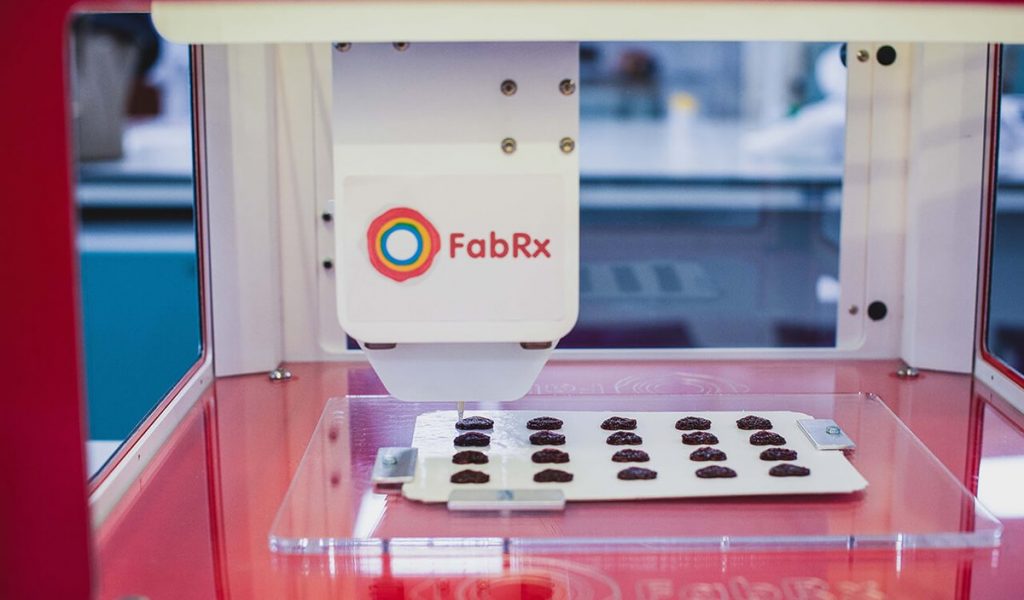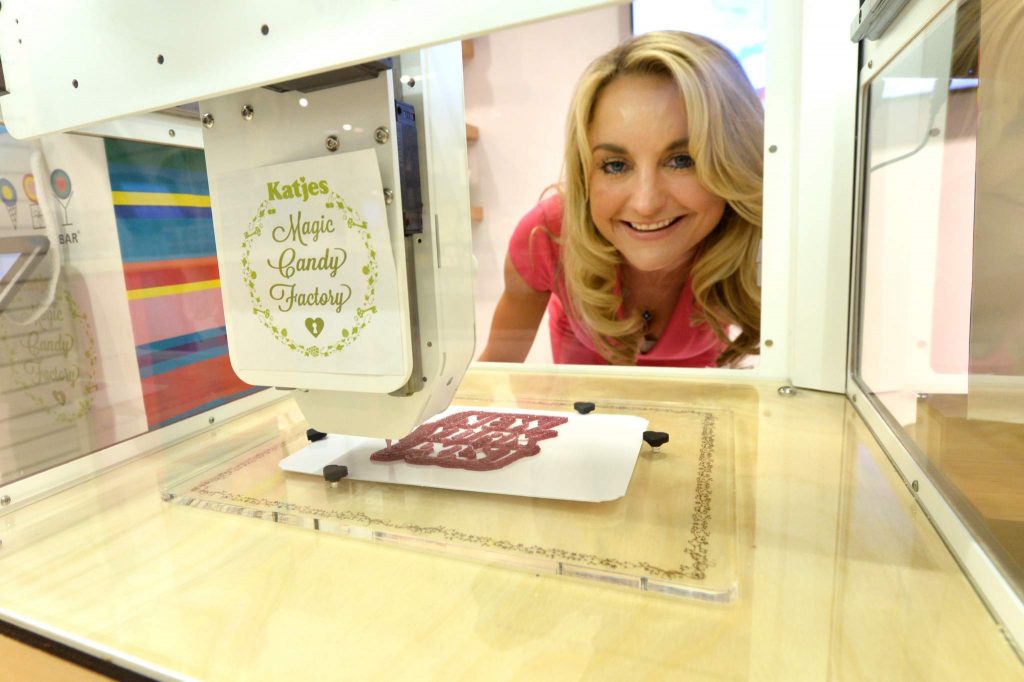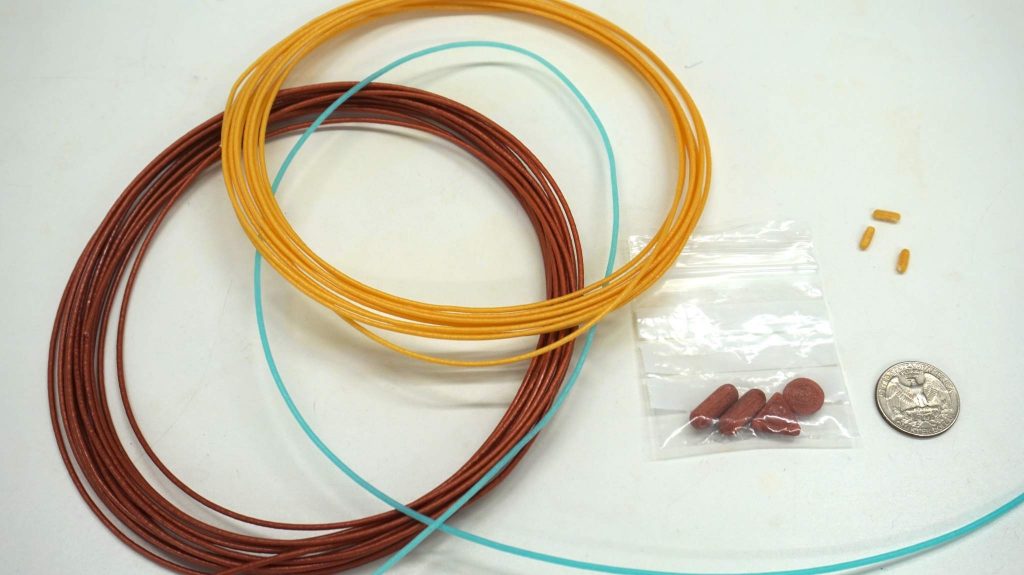The UK government’s Technology Strategy Board Innovate UK has granted over £650 thousand to a project seeking to produce 3D printed medicines. Awarded in two separate lots as part of the board’s Medicines manufacturing round 2: challenge fund, UCL spinout company and project lead FabRx, was granted £380 thousand, and Katjes Fassin UK Ltd., a regional branch of German confectionery company Katjes Fassin GmbH + Co. KG, was granted almost £280 thousand. By combining their technologies, the two entities are focusing on the commercialization of 3D printer hardware and materials that can produce personalized medicines for human consumption.
The project, titled “3D Printing of Pharmaceutical Products for Bespoke Medicinal Delivery” started November 1, 2018, and is scheduled for completion October 31, 2020. In total it is expected to cost the companies in excess of £940 thousand: £550 thousand for FabRx and almost £400 thousand for Katjes. In a public announcement on the project Melissa Snover, Managing Director at Katjes Fassin UK that also operates in the region as Magic Candy Factory, confirmed that it was also featured the involvement of Remedy Health. Remedy Health is a startup founded by Snover that seeks to provide individuals with personalized, 3D printed vitamin supplements and, eventually, medicines.

FabRx Printlets and Magic Candy Factory
FabRx was founded in 2014 by a group of academics at University College London (UCL). At present, the company employs four different 3D printing methods (SLA, SLS, FFF and semi-solid extrusion) to medicinal development. Pill models at the company include its trademark “Printlets” technology – tablets 3D printed to contain specific dosages of a drug in a variety of shapes and sizes, making them easier to swallow. The company also produces Polypills – tablets for the controlled release of multiple different medicines – and chewable medicines – which have been developed in collaboration with Katjes.
Conversely, Katjes Magic Candy Factory food-safe device is a kind of semi-solid extrusion system used to make 3D objects out of a gel formula, termed “gummies.” This method, and the jelly material used in the process, is the subject of a number of patents owned by Magic Candy Factory parent company Katjes Fassin and Co GmbH KG.

3D printed pills for pharmaceutical use
The object of FabRx’s collaboration with Katjes is to adopt modify and verify the Magic Candy Factory 3D printer and its material for use in the medical industry, so that it can be adopted in a hospital pharmacy setting.
As stated in the public description of the project, the key challenges of this undertaking are, firstly, the “limited validation of use of the types of food grade materials that form the basis of the 3DP tablets,” and, secondly, “development of the tablet production hardware to provide in-situ confirmation of the table dose (key regulatory requirement).”

Some of the products of this development will then be marketed via Snover’s Katje spinoff company Remedy Health. “We are thrilled to be able to use our patented 3D printing technology to provide an improved experience to medical patients all over the world,” comments Snover, “Our vision to create personalized medicine will revolutionize the way people take medication and make their treatment more accurate, more efficient and more enjoyable.” The first 3D printed vitamin supplements from Remedy Health, which recently featured on Dragon’s Den (A UK equivalent of Shark Tank), are expected to be released in the UK this summer, under brand name Nourished.
Dr. Alvaro Goyanes, Director of Development and co-founder at FabRx,adds, “FabRx is delighted to receive this award which follows many years of underpinning research into 3D printing of medicines,”
“We are excited to work with the Magic Candy Factory, the world’s leading manufacturer of 3D printed food products, to bring 3D printing of medicines a significant step closer to the market.”
In a visit to FabRx’s London headquarters in 2017, 3D Printing Industry saw the company amidst placebo testing and pre-clinical of its 3D printed pills. Speaking at the time of this interview in relation to the medicine’s availability, Dr. Goyanes said,
“The technology is there already, it is just the regulations that we have to get through.”
Elsewhere, 3D printed medicine is underway – most notably in the FDA approved medicine from Aprecia in the US. Regulatory approval for Spritam was granted in 2015. However unlike the FabRx processes Aprecia uses a jetting technology.
Make your nominations for 2019 3D Printing Industry Awards now – this stage of the awards closes March 1, 2019. For more 3D printing news updates subscribe to our newsletter, follow us on Twitter and like us on Facebook. Visit 3D Printing Jobs for new opportunities in your area.
Featured image shows colorful FabRx Printlet capsules with quarter for scale. Photo by Beau Jackson.



